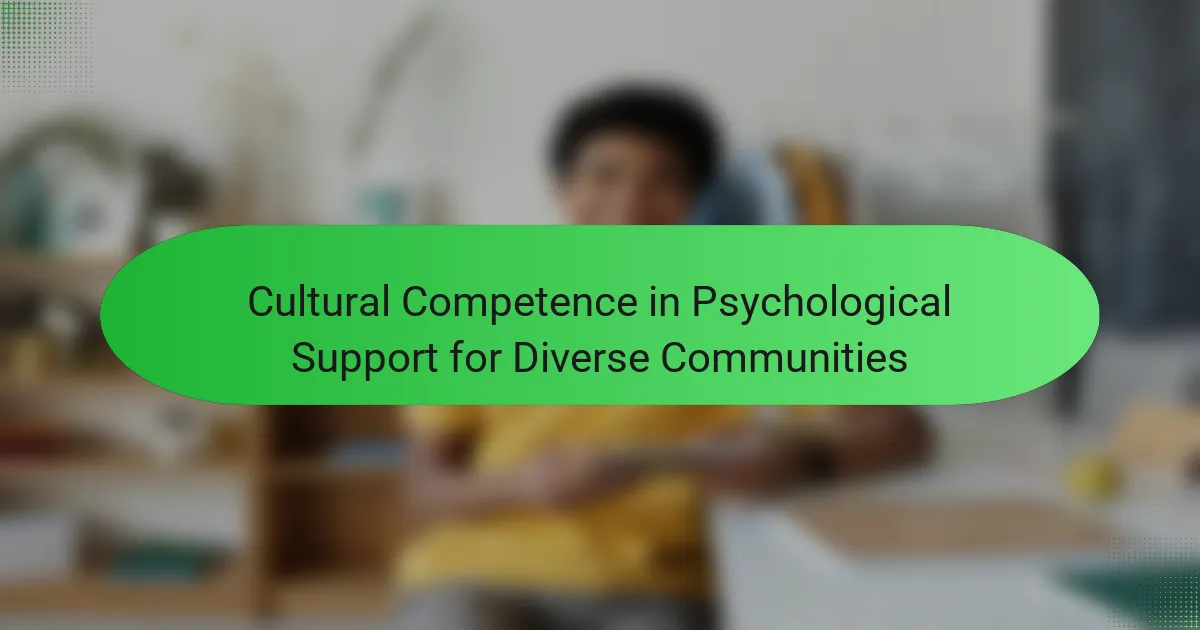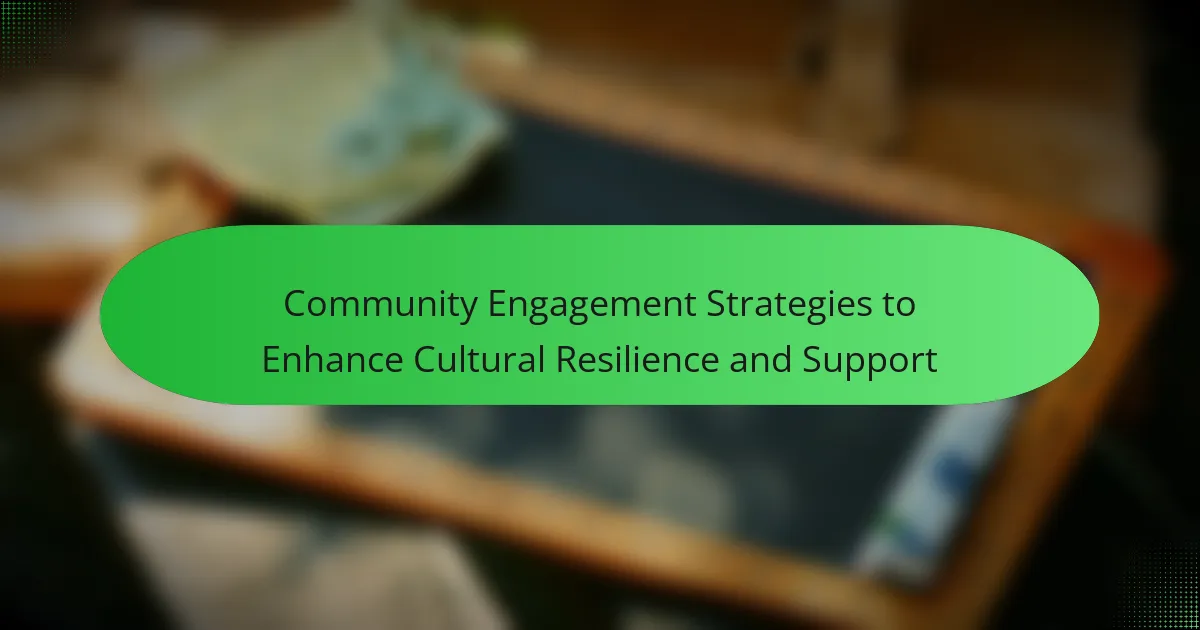Building resilience through volunteerism and community service enhances mental health and fosters social connections. Engaging in community service boosts self-esteem and cultivates empathy. Understanding regional challenges is crucial for effective volunteer initiatives. Integrating volunteerism in education improves student outcomes and community ties. Effective programs require clear goals and strong leadership to empower volunteers and strengthen community resilience.
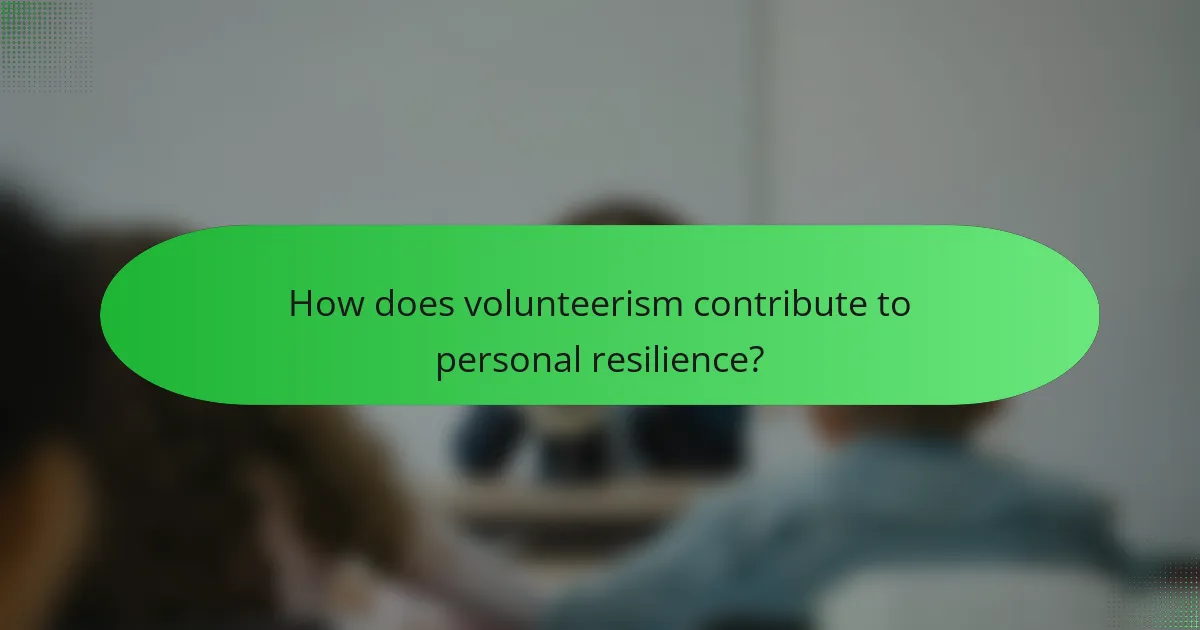
How does volunteerism contribute to personal resilience?
Volunteerism significantly enhances personal resilience by fostering social connections, boosting self-esteem, and promoting a sense of purpose. Engaging in community service provides individuals with opportunities to face challenges, develop problem-solving skills, and cultivate empathy. As a result, volunteers often experience reduced stress and improved mental health. Studies indicate that people who volunteer regularly report higher levels of happiness and life satisfaction, reinforcing their ability to cope with adversity.
What psychological benefits arise from community service participation?
Participating in community service enhances psychological resilience by fostering a sense of belonging, purpose, and accomplishment. Engaging in volunteer activities allows individuals to build social connections, which can reduce feelings of isolation and depression.
Research indicates that volunteers often experience increased self-esteem and improved mood due to the positive impact of their contributions. For example, a study found that individuals who engage in regular volunteer work report higher levels of happiness and life satisfaction.
Additionally, community service can help develop coping skills and emotional regulation, enabling individuals to navigate life’s challenges more effectively. This process of helping others can create a unique sense of fulfillment, reinforcing resilience in the face of adversity.
Overall, the psychological benefits of community service participation significantly contribute to personal growth and emotional well-being.
Which skills can be developed through volunteering?
Volunteering develops various skills that enhance personal and professional growth. Key skills include leadership, teamwork, communication, problem-solving, adaptability, and time management.
Through volunteerism, individuals often face new challenges, fostering resilience. This experience can significantly improve emotional intelligence and cultural awareness, as volunteers interact with diverse communities.
Moreover, volunteering provides opportunities to practice conflict resolution and critical thinking, which are essential in both personal and work environments. These skills contribute to a well-rounded character, making volunteers more effective in various life situations.
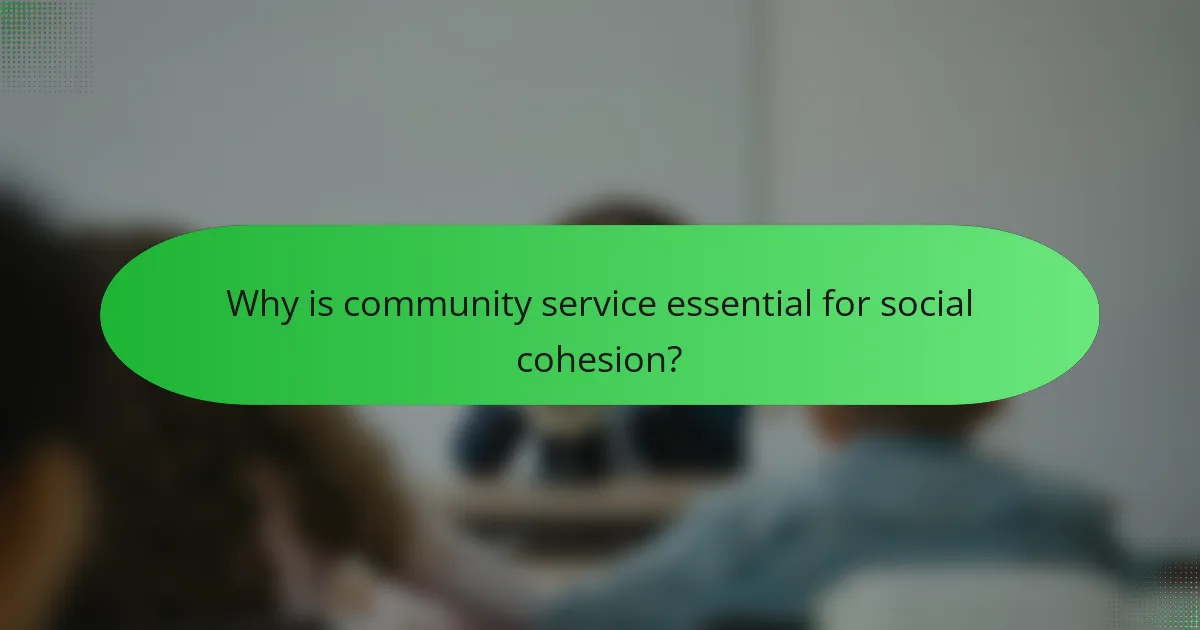
Why is community service essential for social cohesion?
Community service is essential for social cohesion as it fosters connections and mutual support among individuals. It builds trust, encourages collaboration, and promotes a sense of belonging. Engaging in volunteerism enhances community resilience by addressing local needs collectively. For example, studies show that communities with high volunteer rates experience lower crime rates and improved mental health. By participating in community service, individuals develop empathy and understanding, which are crucial for maintaining social harmony.
How does volunteerism foster connections among diverse groups?
Volunteerism fosters connections among diverse groups by promoting understanding and collaboration. Engaging in community service allows individuals from different backgrounds to work toward common goals. This shared experience builds trust and breaks down barriers. Research indicates that volunteerism enhances social networks, leading to stronger community ties. As a result, diverse groups can share perspectives, fostering empathy and mutual respect.
What role do local organizations play in promoting community service?
Local organizations are crucial in promoting community service by facilitating volunteer opportunities and fostering collaboration. They connect individuals with local needs, enhancing social ties and resilience. Through outreach programs, these organizations educate citizens on the importance of service, encouraging participation. They also coordinate resources, ensuring effective responses to community challenges, which strengthens the community’s overall capacity to thrive.
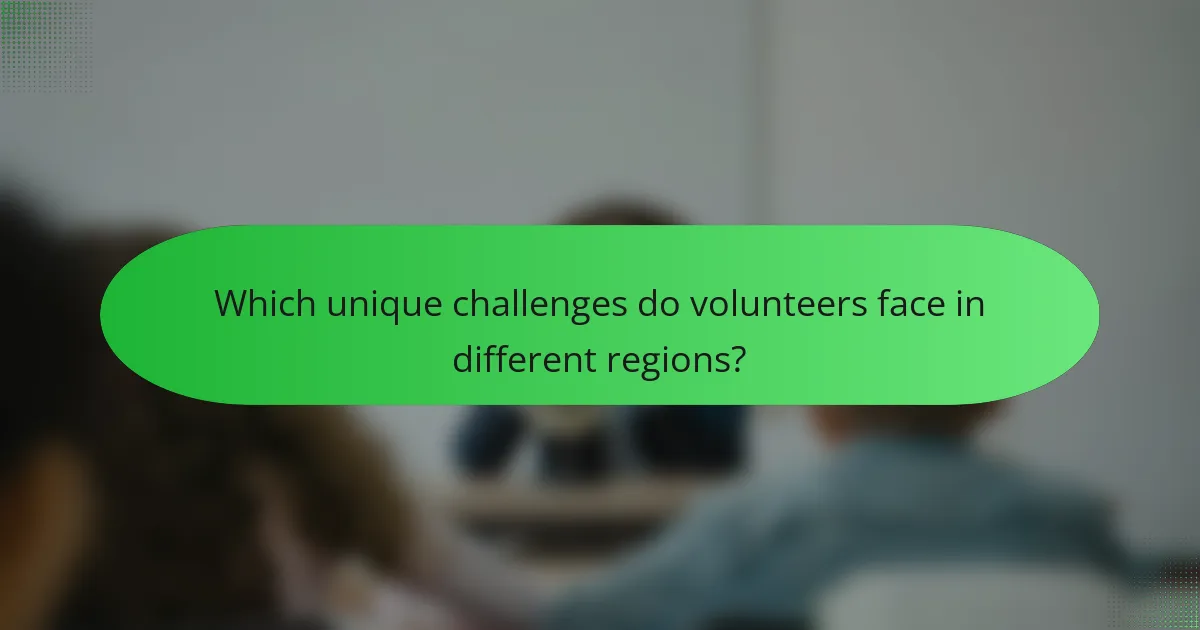
Which unique challenges do volunteers face in different regions?
Volunteers face unique challenges influenced by regional contexts. These challenges include cultural differences, resource availability, and varying levels of community engagement.
In urban areas, high population density can lead to competition for volunteer opportunities. Rural regions may struggle with limited access to resources and fewer volunteers.
Geopolitical issues can create barriers in conflict zones, complicating volunteer efforts. Additionally, climate-related challenges may impact regions prone to natural disasters, requiring resilience and adaptability from volunteers.
Understanding these regional distinctions is crucial for effective volunteerism and community service initiatives.
How can volunteers adapt to cultural differences in service projects?
Volunteers can adapt to cultural differences by practicing active listening, showing respect, and being open-minded. Understanding local customs fosters trust and collaboration. Engaging with community members enhances cultural awareness and promotes effective communication. Flexibility in approaches allows volunteers to respond to unique community needs.
What are some success stories of overcoming obstacles in volunteerism?
Many individuals have successfully overcome personal challenges through volunteerism. These stories often highlight resilience and personal growth.
One notable example is a woman who faced severe depression. She began volunteering at a local shelter, which provided her with a sense of purpose. As a result, she not only improved her mental health but also inspired others in similar situations.
Another inspiring story involves a young man who struggled with addiction. He started volunteering in community clean-up projects, which helped him build a support network. His commitment to service fostered accountability and ultimately led to his recovery.
These success stories illustrate how volunteerism can transform lives by providing opportunities for connection, purpose, and personal development.
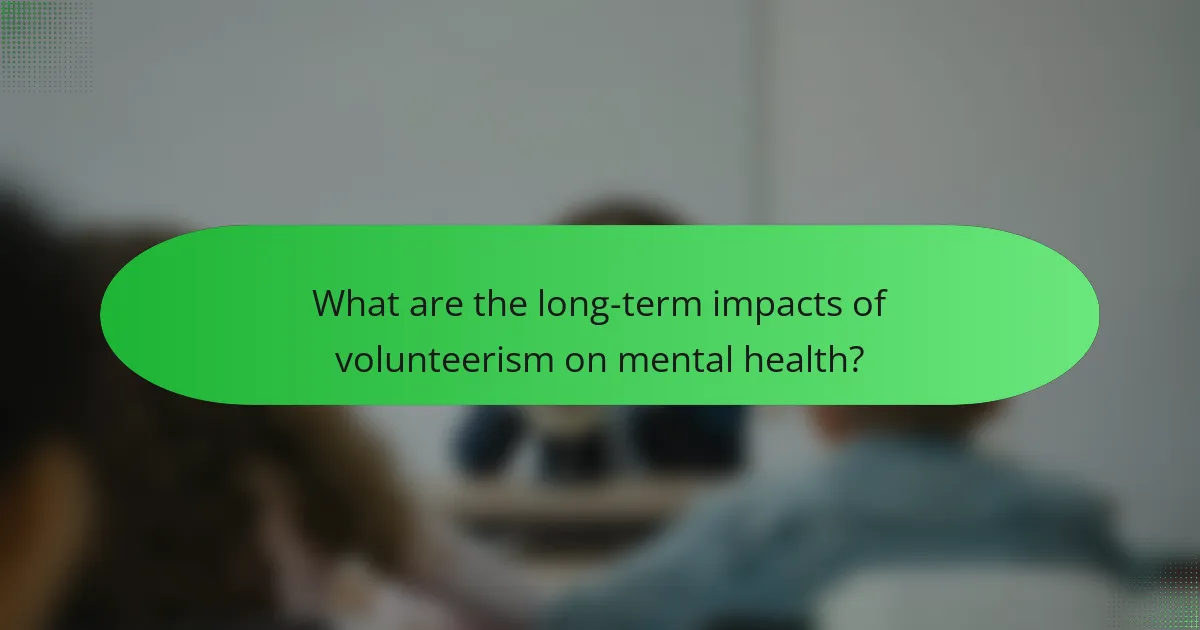
What are the long-term impacts of volunteerism on mental health?
Volunteerism significantly enhances mental health by fostering resilience and social connections. Participants often experience reduced stress, increased self-esteem, and a sense of purpose. Long-term engagement in community service has been linked to lower rates of depression and anxiety. Studies indicate that individuals who volunteer regularly report improved emotional well-being and life satisfaction. This positive impact is attributed to the supportive relationships formed and the fulfillment derived from helping others.
How does sustained community service influence life satisfaction?
Sustained community service significantly enhances life satisfaction by fostering a sense of purpose and belonging. Engaging in volunteerism builds resilience, as individuals develop coping skills and strengthen social connections. Research indicates that consistent participation in community service activities correlates with improved mental health and overall well-being. Additionally, volunteers often report higher levels of happiness and fulfillment, showcasing the transformative impact of altruistic behavior on personal life satisfaction.
Which demographic groups benefit most from volunteer experiences?
Young adults, seniors, and marginalized groups benefit most from volunteer experiences. Young adults gain skills and networking opportunities, enhancing employability. Seniors experience improved mental health and social connections through community engagement. Marginalized groups often find empowerment and advocacy support, fostering resilience and community ties. Research shows that volunteering can reduce social isolation and increase well-being across these demographics.

How can volunteerism be integrated into educational programs?
Integrating volunteerism into educational programs enhances student resilience and community connection. Schools can incorporate service-learning projects, where students apply academic knowledge to real-world challenges. This approach fosters empathy, teamwork, and problem-solving skills. Research indicates that students engaged in volunteerism show improved academic performance and social skills. Additionally, partnerships with local organizations can provide resources and mentorship, enriching the educational experience.
What models exist for incorporating service learning in schools?
Several models exist for incorporating service learning in schools, enhancing resilience through volunteerism. Project-based learning integrates community service into curriculum, fostering practical skills and civic responsibility. Reflection-based models encourage students to analyze experiences, deepening understanding of societal issues. Partnerships with local organizations provide hands-on opportunities, promoting collaboration and real-world impact. Lastly, interdisciplinary approaches blend service learning with various subjects, creating a holistic educational experience.
Which outcomes have been observed in students engaged in community service?
Students engaged in community service often display improved resilience, enhanced social skills, and increased academic performance. Research indicates that these experiences foster emotional growth and a sense of belonging. Additionally, students develop problem-solving abilities and a commitment to civic responsibility. Engaging in volunteerism can lead to long-term benefits, including a stronger sense of purpose and better coping strategies in challenging situations.
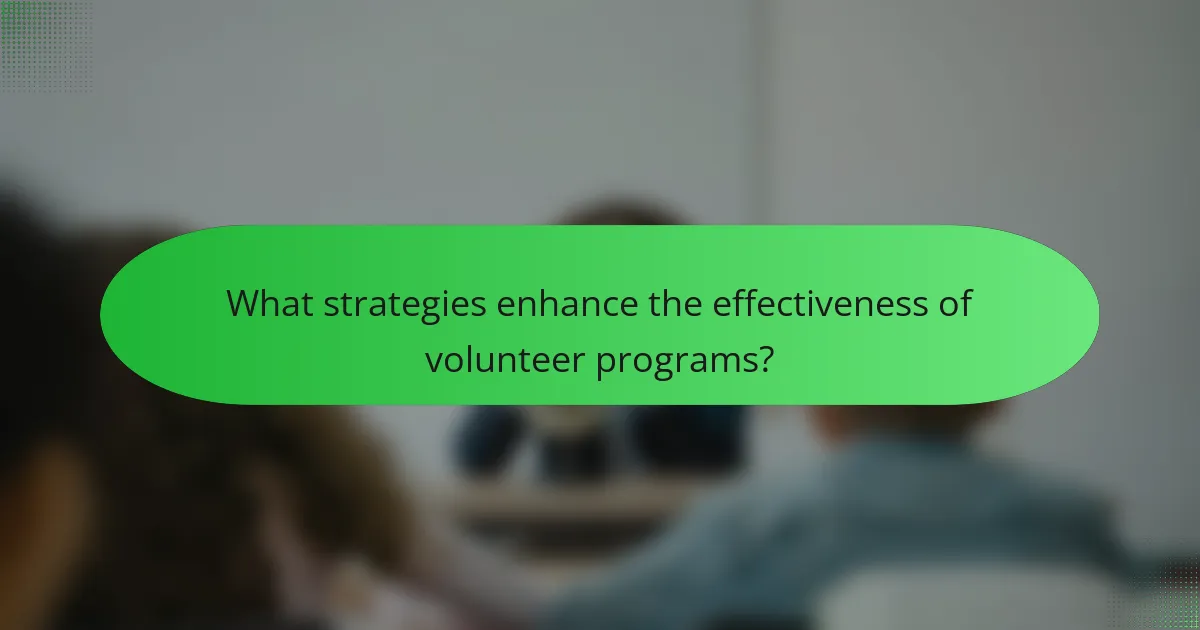
What strategies enhance the effectiveness of volunteer programs?
Effective volunteer programs enhance community resilience through clear goals, strong leadership, and ongoing training. Engaging volunteers in meaningful roles fosters commitment and satisfaction. Regular feedback and recognition improve retention and motivation. Collaboration with local organizations expands resources and impact. These strategies create a supportive environment that empowers volunteers and strengthens community ties.
How can organizations measure the impact of their volunteer initiatives?
Organizations can measure the impact of their volunteer initiatives through various metrics. Key methods include tracking volunteer hours, assessing community feedback, and evaluating project outcomes. Surveys can gauge volunteer satisfaction and community needs. Additionally, analyzing social media engagement can reflect public perception. Regular reporting on these metrics helps organizations refine their strategies.
What best practices should be followed to retain volunteers?
To retain volunteers, organizations should focus on fostering a supportive environment and recognizing contributions. Regular communication and meaningful engagement enhance volunteer satisfaction. Providing training opportunities helps develop skills and build confidence. Acknowledging achievements creates a sense of belonging and purpose.
Which common mistakes should organizations avoid in volunteer management?
Organizations should avoid common mistakes in volunteer management to build resilience. Key errors include unclear expectations, inadequate training, lack of communication, and insufficient recognition of volunteers. These mistakes hinder engagement and retention, impacting the overall effectiveness of volunteer programs. Establishing clear roles, providing comprehensive training, maintaining open communication, and recognizing contributions can enhance volunteer experiences and foster community service.
